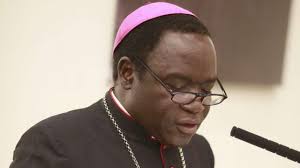
The Catholic Bishop of Sokoto Diocese, Matthew Kukah, on Sunday, said for over 60 years, Nigerian leaders have looked like men in a drunken stupor who stumble and fumble while searching for the way home.
Kukah, in his Easter message made available to newsmen, called on the Federal Government to come up with a robust template for how it wishes to reverse and put the country on a path of national healing.
He said, “Our leaders chose the feast rather than the fast. We are today reaping what we sowed yesterday. For over 60 years, our leaders have looked like men in a drunken stupor, staggering, stumbling and fumbling, slurring in speech, with blurred visions searching for the way home.
“The corruption of the years of a life of immoral and sordid debauchery has spread like cancer destroying all our vital organs. The result is a state of a hangover that has left our nation comatose.
“Notwithstanding, Easter is a time to further reflect on the road not taken. It is a time to see if this Golgotha of pain can lead us to the new dawn of the resurrection. Nigeria can and Nigeria will be great again. Let us ride this tide together in hope.”
As part of measures to curb the current economic woes and curtail hunger among the citizens, the bishop urged the government to come up with some urgent steps to put the nation on the path of healing.
These, he said, must include a deliberate policy of inclusion that will drastically end the immoral culture of nepotism.
He said, “The government must design a more comprehensive and wide-ranging method of recruitment that is transparent as a means of generating patriotism and reversing the ugly face of feudalism and prebendalism
“There is a need for a clear communications strategy that will serve to inspire and create timelines of expectations of results from policies.
“There is a need for clarity over questions of the who, what, when, and how national set goals are to be attained and who can be held accountable.”
The bishop added, “Second, the notion of rejigging the security architecture is a hackneyed cliché that is now at best, an oxymoron. It is difficult to fathom our current situation regarding the ubiquity of the military in our national life.
“It is impossible to explain how we can say we are in a civilian democracy with the military literally looking like an Army of occupation with an octopussean spread across all 36 states and Abuja.
“This has very serious consequences both for its professionalism, its integrity and perceived role in protecting society. No other person than the immediate past Chief of Defence Staff, General Lucky Irabor, who recently referred to the military as facing the dilemma of what he called ‘see finish.’ It is now difficult to say whether the persistence of insecurity is a cause or a consequence of military ubiquity.
” Trillions of naira continue to go into bottomless pits with little measurable benefits. Our military’s professionalism cannot be diluted by the recruitment of hunters, vigilante groups, and other unprofessional and untrained groups.”
Kukah noted that “this is not sustainable because it leaves the military open to ridicule and perceptions of surrender. Fighting insecurity is now an enterprise. I believe our security men and women can defeat these criminals in a matter of months. All we hear and see are fingers pointing to the top. No, this must end.”
The bishop expressed delight that President Bola Tinubu recently announced that kidnapping and banditry are now to be treated as acts of terrorism.
“If so, we need to see a relentless and implacable plan to end this menace with a definite deadline for bringing these terrorists to their knees, no matter what it will take,” he said.
Kukah encouraged the President to continue on the path of probity, to take further steps to cut down the overbearing costs of governance and to put in place more comprehensive plans towards achieving both food and physical security across the country.
He said merely distributing money through already corruption-riddled structures is not enough and diminishes the dignity of citizens.
The cleric argued that no one needs to line up to receive aid when the nation is not in a war.
“Give our people back their farms and develop a comprehensive agricultural plan to put our country back on the path of honour and human dignity,” he said.

